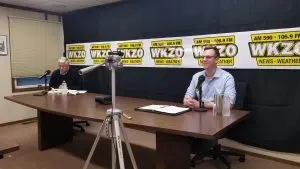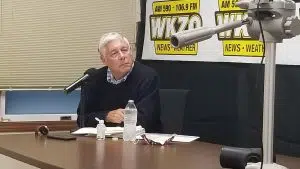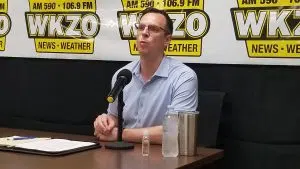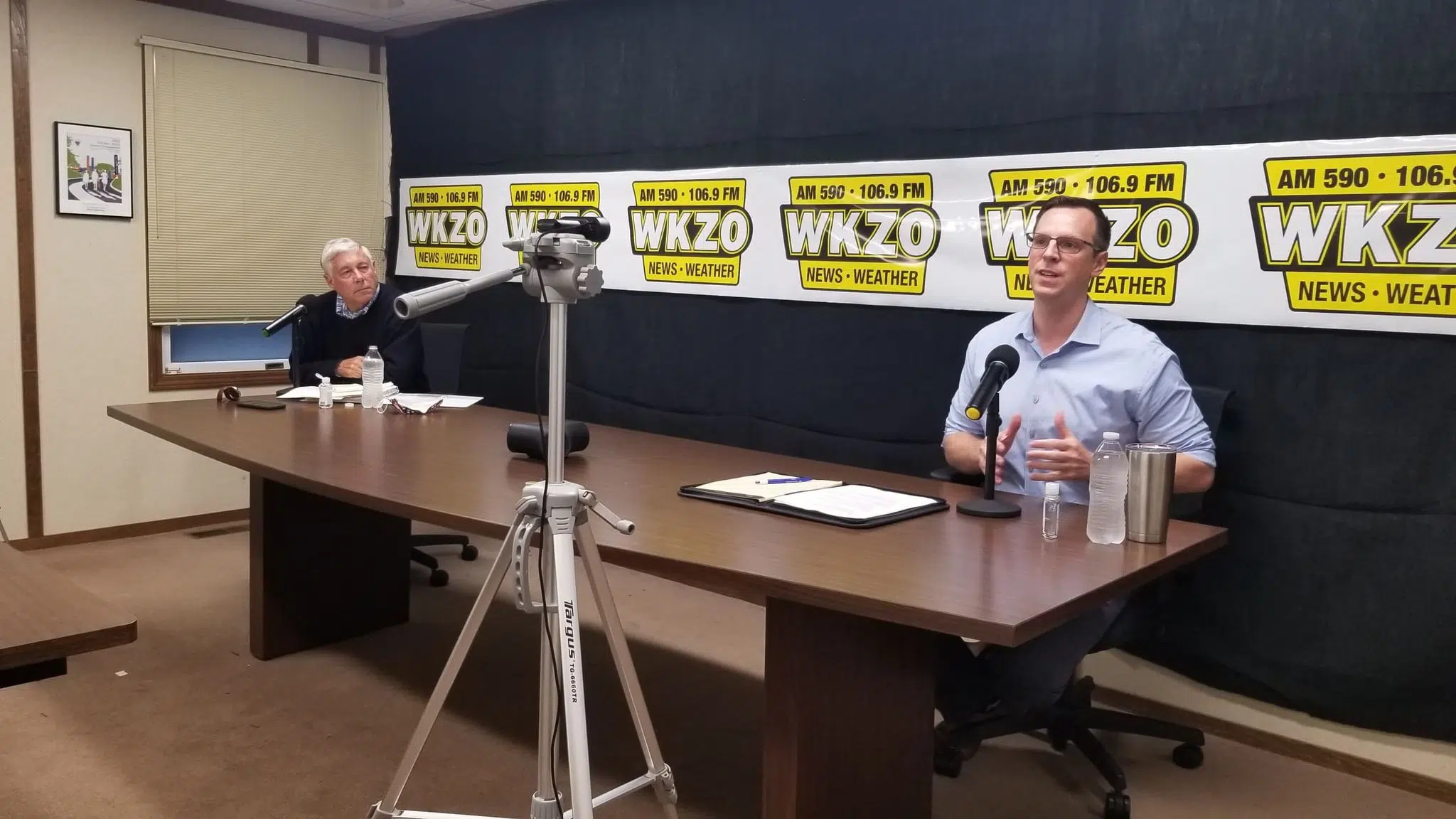KALAMAZOO, MI (WKZO AM/FM) — Monday morning, two major Congressional candidates participated in a live, one hour debate on 590 AM and 106.9 FM WKZO.
Democrat and State Representative Jon Hoadley is challenging long-time incumbent Republican Representative Fred Upton to represent Michigan’s 6th Congressional District.
37-year-old Hoadley is a three-term Michigan state representative for District 60. More on Hoadley’s campaign can be found here. 67-year-old Upton was first elected in 1986 and is seeking his 18th consecutive term. Upton’s website can be found here.
In addition to Upton and Hoadley, there are also two other candidates running for this Congressional seat and will appear on the ballot on November 3rd. 35-year-old Jeff Depoy is the Libertarian candidate. More on Depoy and his campaign can be found here. And 31-year-old John Lawrence is with the Green Party. His Facebook page can be found here
On Monday at 9 a.m., both candidates joined WKZO for the debate, which included question from local listeners. The podcast for the debate can be listened to at this link, and the recap can be viewed below:
ABSENTEE VOTING: What is your opinion on absentee voting? Do you believe it is legitimate and safe?
Hoadley: We’re in the middle of a global health pandemic, and so we need to make sure we’re protecting every aspect of democracy. Last week, I was able to vote for a bill that would make sure that the men and women protecting us overseas, active military personnel, would be able to cast their vote securely, and their spouses could as well. I think the people defending democracy should be able to participate in democracy, so I support voting by mail. I want to make sure that whether folks are returning it through the United States Postal Service, at a drop box or choosing to vote in person on November 3, that their vote is counted, their vote is tallied securely, and that we protect both the integrity of the election, as well as the health of our communities.
Upton: I support Michigan’s absentee ballot system, it works. People are registered to vote, the clerk has a record of their signature, their birth date, their address, for any reason, they can vote. I voted absentee this last month in August because I thought Washington was still going to be in session, so both my wife and I voted. My parents, my mom is now 91, and my dad is 96, they’ll both be voting absentee this fall. The system works as it should. One of the reasons why I voted for more money for the postal service this last month was to make sure those ballots are going to get there on time. I met with a number of postal officials throughout our district to make sure they’ve got the right equipment to make sure they’re going to get there on time. I’ll be quite satisfied, I know, that those absentee ballots will be tabulated correctly and on time.
Listener Question: Mask Mandate. With the pandemic going on, masks have become a controversy in some ways. What are your

Congressman Fred Upton during a live WKZO debate on 9/28/20. (Photo by Jeana Gondek)
positions on wearing a mask?
Upton: I support a mask, both Jon and I wore masks coming in today, I wear it in public every place I go. In the absence of a vaccine, in the absence of real daily immediate inexpensive testing, I think we all ought to wear a mask. My wife has Lupus, and my parents are 91 and 96. In fact, the CDC has reported that as many as perhaps a hundred thousand lives can be saved between now and the end of the year if we all are attentive and wear masks. As I do grocery shopping, as I go to any retail store, we keep our social distancing as we are in this room now, as we wash our hands frequently, it’s important that we wear masks. But we also know there’s some good news coming, we’re gonna have tests and we’re gonna have an FDA-approved vaccine.
Hoadley: I encourage folks to wear masks. As a reminder, wearing a mask is about helping keep everybody else safe. There are so many folks who interact in our lives who have a chronic condition or weakened immune system, and a mask helps keep them safe. I think this is part of this important conversation around not only developing a vaccine, but then as many folks who can to get the vaccine. We have to reach a certain level of saturation in the community so that we can all be safer. There’s a few things that I hope we can take from this global health pandemic moving forward – there’s some best practices that keep us all healthier. Let’s wash our hands a little bit more frequently, let’s make sure that if you’re not feeling well, that you’re putting a mask on to help reduce the spread of any influenza or other infections disease. Let’s continue to lift up the good behavior that we want to see in our communities.
Payroll Tax: Should the payroll tax be maintained in order to fund Medicare and Social Security?
Hoadley: Seniors have earned Social Security and Medicare, they’ve been paying it for their entire lives. I’m worried because some of the comments that we’ve seen come out of President Trump would weaken, and perhaps bankrupt, Social Security in as little as three to four years. I don’t think that’s right. I believe that we should be expanding and protecting Social Security, I am going to always oppose privatization efforts that would rob Social Security and decrease benefits for seniors. I think we should have more health care, not less, and Medicare is an important part of that equation. Social Security is one of the best ways to prevent our loved ones and seniors from being in poverty, and I think that we owe it, because seniors have earned it, to fight and protect Medicare and Social Security.
Upton: I think I’ve served on the Social Security Bipartisan Caucus virtually all the years I’ve served in Congress. I have long opposed the privatization of Social Security, and I want to strengthen that as well as Medicare. The proposal that the President has made to reduce or delay the payroll taxes would, without resources, undermine the contributions to the Social Security trust fund, so that’s not gonna happen unless there is a direct appropriation to make up for that. I don’t think at this point anyone is actively considering a payroll tax delay or deferral, that’s not in the Problem Solvers Caucus that we’ve made, it’s not on the table as far as I can determine now from the White House. Again, without a direct infusion of cash to make up for it, it would clearly undermine Social Security benefits, and as Jon said, quicken the time when it would actually be bankrupt. We don’t want that to happen.
U.S. Supreme Court Seat: This is a two-part question – What is the potential impact of the soon-to-be filled vacancy on the U.S. Supreme Court? Should the seat be filled before or after the election?
Upton: The constitution is pretty clear – when there is a vacancy, the President makes a nomination, and the Senate then takes deliberate action to determine whether that candidate is qualified or not, and as a vote in the U.S. Senate. The President made the announcement Saturday, we’ll see if she’s qualified based on the hearings, we’ll see how the vote goes, but the constitution requires that the President make that nomination. He has done so, and to me, I would hope that if she’s confirmed, she’ll follow the law and note make it.
Hoadley: The process will be up to the Senate. Health care is on the ballot – weeks after the election, there will be a hearing in front of the Supreme Court about whether the Affordable Care Act should be repealed. That’s gonna be in front of the Supreme Court, health care is on the ballot, equal pay for equal work is on the ballot, justice for our LGBTQ friends are on the ballot. The Congress will then have a choice about, regardless of what happens in the supreme court of how we respond. So that’s why when I say health care is on the ballot, it means will congress be ready to step up and pass laws that protect pre-existing conditions? I’m a yes, unfortunately, Fred Upton has voted no. Will we be able to expand health care or lower prescription drugs? I’m a yes, and unfortunately, Fred Upton has voted no. That’s what I think is most important as we’re moving forward – this will be up to the Senate to decide. The president has nominated, and we’ll have to see what happens next.
Listener question: Rural-Urban Divide, Internet Access – I moved here 10 years ago, and we had one cable internet company, and it

Congressman Fred Upton and State Representative Jon Hoadley during a live debate at WKZO on 9/28/20. (Photo by Jeana Gondek).
wasn’t very good. Fast forward to today, I have two kids and virtual learning to deal with, and we still have one cable internet provider, and it’s still not very good. What do you think Congress can and needs to do in order to bridge this Rural – Digital divide?
Hoadley: We are trying to adapt to the COVID-19 situation, and that means virtual learning for a lot of parents. But our small businesses and so many of our rural neighbors have been dealing with bad internet for a very long time. I’m proud that just last week, I was able to vote for a bill that’s going to invest in rural broadband. I’m ready to deliver results on these issues. We’ve seen gridlock that’s come from campaign financial issues because some of the biggest telecoms are making the biggest donations to keep things the way they are. But the way that things are, aren’t working for a lot of people. I’m ready to make sure that we are removing some of the restrictions that let the biggest telecom companies have a monopoly on our markets. I’m ready to make sure that we’re allowing co-ops in private and public investment in both our urban and rural broadband. Let’s make sure more of our customers, constituents and friends get the best internet in the world.
Upton: Broadband, we need it much more, we need more competition. [Jim Clyburn] and I introduced legislation earlier this summer, and we’ve got a lot of bipartisan co-sponsors. The idea is to force the FCC to do an earlier spectrum auction, and then use those proceeds to go to underserved areas. For Michigan, that means more than a hundred million dollars a year, a billion dollars over ten years. I want to say next week I’m intending to be with a number of our different providers that will look forward to this money, and we’re also looking to see over ten billion dollars added to the next COVID package so that we can help our schools and businesses deal with broadband shortages as we try to face the issues of the 21st century.
Climate and Environment: What is the role of Congress in balancing energy needs while still protecting the nation’s environment, especially our Great Lakes waters, rivers, and lakes here in Michigan?
Upton: When I chaired the Energy and Commerce Committee, I helped write the proposals to make North America energy-independent. We now export energy, rather than import it, to the tune of about a billion dollars a day. We’ve created hundreds of thousands of jobs, and coming into Kalamazoo today, it’s nice to see gasoline at $2 a gallon or so, better than the $4 or $5 a gallon like it was when I began to chair. Though I oppose the president pulling out of the Paris Agreement, we’ve actually seen real carbon reductions since 1995 in a pretty significant way. We’re well on the way to see our coal plants eliminated and be replaced, so we’re making progress.
Hoadley: We have to protect our Great Lakes, it’s one of the unique aspects of Michigan. We know that we’re the defenders of over 20 percent of the world’s fresh water. Plus, we depend on the Great Lakes, not only because it’s where we like to go on the weekend, but it’s also our jobs and economy. When we talk about energy, we have to be thinking towards the future. We should be investing in green energy, renewable sources of energy, because those are jobs we can have right here in Southwest Michigan that can’t be outsourced or offshored. They’re jobs that are gonna help us get ahead of the climate crisis that we’re in right now, so we can be doing our part to further reduce our carbon footprint, and make sure that we’re investing in jobs that our children and grandchildren are gonna be able to grow up and strive for.
Listener Question: What are you going to do for Michigan to help us recover from the economic shutdown? Do either of you support the extension of unemployment or do you support another round of stimulus checks?
Hoadley: My office has dealt with hundreds of concerns around unemployment. Families are struggling, we have to help people get back to work. That’s why I’ve been proud to support those programs here at the state level that invest in small businesses, that provide Restart Grants. That’s why I’ve been proud to fight for modernizing our Unemployment Insurance Agency so people’s claims get moved faster, and people get the help they need a little faster. We’re not out of this yet, so as we worry about what happens next, it’s important that we have a strong support for unemployment and stimulus moving forward so we can really round the curve and help get our economy back to work.
Upton: When the Senate failed to move a stimulus package last month, it was the Problem Solvers Caucus that stepped up to the plate. We worked through Labor Day weekend, our group of 50 members came to a consensus that in fact likely may have a bill on the House floor this week. It’s gonna add, not only to the unemployment, but also another round of stimulus checks for those that are most needed. We’re also going to provide another round of PPP loans, Paycheck Protection Program money for our small businesses. From my office, we work around the clock helping hundreds of businesses throughout Southwest Michigan, make sure were able to be given a grant to be able to stay open and pay their employees. This wasn’t over at Easter – as much as all of us wanted it over by Easter, we still have it today, which means we need to continue to act to make sure those less fortunate still have the ability to survive these very, very tough times.
Trump Election results:

Congressman Fred Upton during a live WKZO debate on 9/28/20. (Photo by Jeana Gondek)
Upton: “We’d better not have a choice. Whoever wins the November 3rd election needs to be sworn in on January 20th. We have a democracy, we have elections, and whether its a transition of power or continuation, whether he wins reelection or not, at some point you need to make sure that the process is complete. Based on the electoral votes, the winner needs to raise their right hand on January 20th, take the Oath of Office, and move the country forward in a very peaceful way. At the end of the day, the process works as it should.
Hoadley: We have a democracy if we can keep it, and I was glad to see so many people to support the peaceful transition of power. I also support the peaceful transition of power, but it’s alarming that had to be said in the first place. This, I think, speaks to why we need to see broader democratic reforms. Let’s make sure we defend everyone who is legally allowed their right to vote. Let’s expand those innovations that we’re seeing here as a State to the rest of the country. We shouldn’t be living in that moment of question, and when we know that Michigan has some of the best ideas of how to defend democracy, let’s make sure it gets to every one of those other states, because then it won’t even be a question. The winner will win, and then we will transition peacefully.
Affordable Care Act: What should be the future of the Affordable Care Act, and should government insurance be available to all?
Hoadley: More people should have health care, not less. Your health care should not be tied to your employment status, because we just lived through a global health pandemic where millions of people lost their health care and their jobs through no fault of their own, just when they needed health care the most. This is an area where we are the most different – you can check the congressional record, Congressman Upton voted 12 times to remove coverage for pre-existing conditions. I think that should be covered. Congressman Upton voted over 60 times to weaken health care, I think that we should expand health care. Congressman Upton voted no on H.R.3 that would have lowered the cost of prescription drugs, and frankly, I think we should make sure medications and our prescriptions are affordable for everyone.
Upton: There’s no question that the health care system is broken and needs to be improved. That was true before the Affordable Care Act, and it’s true now. I don’t believe in taking benefits away from people who already have them, which is why I support keeping Medicaid expansion, which has helped hundreds of thousands of Michiganders get affordable health care. I’m a co-sponsor of H.R.692, which would outlaw any change to current protections on pre-existing conditions, regardless of the rest of the fate of the Affordable Care Act. I was also one of eight Republicans to vote for a resolution condemning the President’s lawsuit against the ACA. Jon Hoadley supports Medicare for All, Joe Biden says that will costs us 30 trillion dollars. Where are we going to get that? It’s going to close rural hospitals, and it’s going to remove employer-sponsored health insurance. That’s not the answer. We need to work together to make sure that we can find a health care system that works, and clearly that’s not been the case up to this point.
Listener Question: Term Limits. Do you or do you not support term limits? And if you do, how long should they be?
Upton: The founders of the constitution debated term limits, and chose not to have them. Michigan voters, back in the 90’s, thought they were a good idea, which is why we have them for the governor and state legislators, but the courts ruled correctly that they did not apply to the congress. The only way you could have them to the congress if you actually pass a constitutional amendment. I actually supported a constitutional amendment to do that back in the 90’s; it did not get the two thirds vote, Senate never took it up. It’s pretty hard to pass a constitutional amendment, so that’s really not in the cards to happen. I believe that the voters have the right to make their choices, and we make sure all voters are educated and are able to take that opportunity to go to the polls.
Hoadley: We’ve seen term limits in the State of Michigan, and I think we’ve learned a lot from that conversation. When we have a functioning democracy where we have non-gerrymandered districts, or people can vote where we decrease the influence of money in politics, then people, not special interest groups, would have the best say. At the same time, I think with conversations happening around Supreme Court term limits, what would be an appropriate set of term limits for members of Congress or the Senate? I think it’s a conversation worth exploring. But right now, the current system in Lansing often gives too much power to lobbyists instead of We the People. If we’re gonna do this, let’s get it right. I am open to ideas for term limits and what those numbers should look like, but at the same time I want to make sure we are learning from lessons of the past and building a system to make sure that voters voices are heard the loudest.
Pre-existing Conditions: Should an insurance company have the choice to cover somebody based on pre-existing conditions?

Democrat and State Representative Jon Hoadley during a live WKZO debate on 09/28/20. (Photo by Jeana Gondek)
Hoadley: The answer is no. We need a health care system that covers everybody, and we all bring ourselves to this conversation. Before the Affordable Care Act, we saw insurance companies that, once the bills came due, would try to weasel out of paying the bill they owed. My partner Chris has multiple sclerosis, that means he has a pre-existing condition for the rest of his life. Folks across the district have sent me messages about hemophilia, diabetes, cancers, that they worry if we lost coverage for pre-existing conditions, they wouldn’t get vital health care for the rest of their lives. We shouldn’t be giving away our power to health insurance companies, we need to reclaim our power, and make sure that we and our doctors actually get to decide our course of treatments.
Upton: I want to remind you that I am a co-sponsor of legislation that would outlaw any change to current protections in pre-existing illnesses. It was my amendment on the House floor a number of years ago that required states include that as part of an essential health benefit that they must provide to all of their residents across their states. We all know people with pre-existing illnesses. Every family I would imagine, as mine does, has pre-existing illnesses. If the ACA is struck by the Supreme Court as unconstitutional, we in the Congress need to come back, work together and include a number of basic elements that would continue to protect those with pre-existing illnesses. It’s something that both Republicans and Democrats support, along with making sure children and young adults up to 26 are covered, people can purchase health insurance across state lines, and, if they’re in a small business, be able to create a better risk pool as it relates to the premiums they might pay.
Marijuana: What is your opinion on the idea of the federal decriminalization of marijuana?
Upton: Michigan voters made a decision not only to allow for medicinal use marijuana, but recreational use as well. I support state’s rights, I will support that. It’s likely that we could have a vote later this year that would disallow the Department of Justice to weigh in on those states where voters have made a decision, and I will vote as the Michigan voters did on both of those. We’ve also had issues involving, particularly with banks, the Justice Department and others might be going after banks for loans they might make to agricultural folks that are growing marijuana. We’ve made the decision in Michigan as voters, and those laws need to be upheld.
Hoadley: I support the decriminalization and legalization of marijuana. This is an example of where we’re seeing laws that oftentimes have created disastrous effects, oftentimes disproportionately based on your race. We saw drug laws for so many years disproportionately enforced against communities of color. As a result, we then saw an unequal level of justice. This is an example where, unfortunately, for too long we’ve demonized instead of smartly regulated and controlled a substance. I support making sure we protect the ability to have secure banking, and treat agricultural businesses and marijuana growers in the same way. It’s time we move past this conversation on whether we should have marijuana decriminalize or legalized, and frankly, go back to the things that are really gonna help us move forward as a country.
Listener question: How long do you plan to address the Black Lives Matter beyond the viewpoint of Police Brutality and Criminal Justice, health care, black unemployment rate, housing discrimination, etc.? How do you address these?
Hoadley: I think we should say very clearly, Black Lives Matter. We see racial disparities that exist overwhelmingly in the Criminal Justice System, in our health care system, which is why I’m so proud that Governor Whitmer and Lt. Governor Gilchrist are leading the Racial Disparities Task Force related to COVID-19 and broader health disparities, I support that effort. In economics, so many of the loans that came through for PPP program were actually more likely to be determined by your relationship with a bank then the validity of your business. Unfortunately, for so long, we saw many entrepreneurs of color not have access to those type of programs. I’ve been proud as a legislator to support efforts that are trying to make us that more perfect union that we are all striving for. Let’s life up the voices of black and brown voters, let’s make sure everybody, regardless of your race, has a seat at the table.
Upton: Racism is real, and it’s real unfortunate. We all need to speak out against it, as I have every single year. Black lives do matter, yes they do. John Lewis was a very good friend of mine, he asked me to join with him and march in Selma across the Edmund Pettus Bridge a number of years ago. I didn’t go once, I didn’t go twice, I went multiple times with him to speak out against racism and to have my voice added with his. A number of years ago, we had a number of issues in Benton Harbor and St. Joseph, I asked John Lewis to come back and calm the waters, and he did. So where do we go from here? We need to have additional resources for our police, we need to ban choke holds and have a national registry of officers that might have violated the standards that are there. We need more resources, not less. Bottom line, Black lives do matter, and it’s a wake-up call for all of us.
Final question: How do you feel the current administration’s immigration policy has affected Southwest Michigan?
Upton: The immigration system is broken, it needs to be fixed. The President was right when he said a few years ago, “Congress, do your job,” and I’ve tried to do that. I’ve been on a task force with the Problem Solvers Caucus, we passed legislation that passed the House last December by nearly a hundred votes helping our [agriculture] workers, bringing status to folks. We need to help our Dreamers, many of them came in at age 2 or 3, they’re here 15, 18, 20 years later. They’ve got an education here, they’re raising families, they have jobs here, they pay taxes here. You might remember a case of an individual here in Kalamazoo, a doctor who came from Poland, and he was arrested and detained by ICE because he had some violations like parking too close to a fire hydrant, no seat belt, a couple of speeding tickets. We helped get him out, Governor Snyder gave him a pardon later so that couldn’t be held again. Bottom line is, we need to work together, it’s broke, and we’ve started to do that particularly with our Problem Solvers Caucus.
Hoadley: The immigration system is broken, Congressman Upton has had 34 years to fix that. I think the reality here is that we need to make sure we’re getting back to something that lets us be the beacon of light to the world. Let’s make sure there is a clear system so we can support our agricultural workers and their families, and make sure they are doing work and being protected while they’re here. I believe that we need to make sure there is a clear path for citizenship for folks who want to follow the rules. We have so many people in our backyard that are struggling under the burdens of a broken system, we have immigration courts that are insufficient to the task. If we can work together, we actually can make a system that works for all of our friends and neighbors. That proves some predictability and security for our country, and I’m ready to get to work to do that.
Further viewing:
- A video of the live debate can be viewed on Facebook at this link.
- Both parts of the podcast debate can be listened to at this link.
- MLive also teamed up with Vote411.org to cover where all four candidates stand on a variety of issues. That interview can be viewed here.







